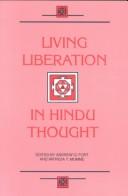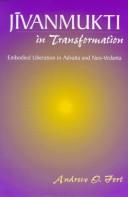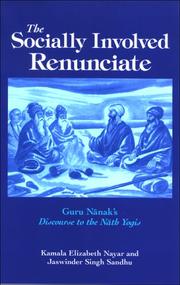| Listing 1 - 3 of 3 |
Sort by
|

ISBN: 0791427056 0791427064 9780791427057 9780791427064 Year: 1996 Publisher: Albany State university of New York press
Abstract | Keywords | Export | Availability | Bookmark
 Loading...
Loading...Choose an application
- Reference Manager
- EndNote
- RefWorks (Direct export to RefWorks)
Moksa. --- Perfection --- Hinduism --- Religious aspects --- Hinduism. --- Doctrines. --- Mokṣa. --- Mokṣa --- Flawlessness --- Perfection (Philosophy) --- Perfectionism (Philosophy) --- Virtuosity --- Wholeness --- Mukti --- Doctrines --- Religious aspects&delete& --- Mysticism --- Philosophy --- Excellence --- Imperfection --- Philosophy, Indic --- Reincarnation --- Self (Philosophy) --- Soul --- Perfection - Religious aspects - Hinduism. --- Hinduism - Doctrines.

ISBN: 0791439046 0791439038 9780791439036 9780791439043 Year: 1998 Publisher: Albany State university of New York press
Abstract | Keywords | Export | Availability | Bookmark
 Loading...
Loading...Choose an application
- Reference Manager
- EndNote
- RefWorks (Direct export to RefWorks)
Liberation (mukti) is a central concern in Hinduism, particularly in Advaita (nondual) Vedanta, perhaps the best known school of Hindu thought. There has been vigorous debate and analysis about the possibility and nature of liberation while living (jivanmukti) in Advaita from the time of Sankara, the school's founder, to the present day. While the general conclusion seems to be that one can achieve living liberation, members of the Advaita tradition also regularly express reservations about, or describe limitiations to, full liberation while embodied.Jivanmukti in Transformation examines the development and transformation of the concept of jivanmukti from the Upanisads to the modern era. It gives the most thorough treatment of the scholastic Advaita tradition on liberation while living, makes the novel argument for a distinct "Yogic Advaita" tradition found in the Yogavasistha and Jivanmuktiviveka, and explores the modern "neo-Vedanta" view of jivanmukti, which has been influenced by modern Western concepts like global ecumenism and humanistic social concern for all. The book includes analysis of the views of modern Hindu figures such as Swami Vivekananda, Sarvepalli Radhakrishnan, Ramana Maharshi, and Sankaracaryas of Kanchi and Sringeri, and considers these thinkers in the context of current academic discussions about the encounter of India and the West.
294.522 --- 294.522 Leer van het Hindoeïsme: Upanishaden; Purva Mimansa; Samkhya; Yoga; Nya Avansesika; Vedanta; Advaita (Sankara); Visistadvaita (Ramanuja); Dwaita (Madhva) --- Leer van het Hindoeïsme: Upanishaden; Purva Mimansa; Samkhya; Yoga; Nya Avansesika; Vedanta; Advaita (Sankara); Visistadvaita (Ramanuja); Dwaita (Madhva) --- Advaita. --- Vedanta. --- Mokṣa. --- Advaita --- Mokṣa --- Vedanta --- Mukti --- Philosophy, Indic --- Reincarnation --- Self (Philosophy) --- Soul --- Hindu philosophy --- Hinduism --- Pantheism --- Theosophy

ISBN: 0791479501 1435606469 9781435606463 9780791472132 9780791479506 0791472132 9780791472149 0791472140 Year: 2007 Publisher: Albany State University of New York Press
Abstract | Keywords | Export | Availability | Bookmark
 Loading...
Loading...Choose an application
- Reference Manager
- EndNote
- RefWorks (Direct export to RefWorks)
The Socially Involved Renunciate is an in-depth analysis and an original English translation of the Siddh Goṣṭ, a fundamental philosophical text of the Sikh tradition. The work reflects the distinctive worldview of Sikhism, the only major Indian religion that does not regard asceticism as a legitimate path to liberation.Composed by Guru Nānak, a medieval, north Indian saint-poet and venerated founder of the Sikh tradition, the Siddh Goṣṭ is a dialogue between Guru Nānak and several Nāth yogis who had been pursuing a rigorous path of hath-yoga as renunciates of the material world. Through their dialogue, Guru Nānak teaches the Nāth yogis a spiritual path that also includes involvement in the social world and offers a practical way to achieve liberation. In The Socially Involved Renunciate, Kamala Elizabeth Nayar and Jaswinder Singh Sandhu provide background on Sikhism, highlight the ethical teachings expounded in the Siddh Goṣṭ, and demonstrate how Guru Nānak reconciles the polarities of the ascetic and householder ideals.
Mokṣa. --- Asceticism --- Renunciation (Philosophy) --- Spiritual life --- Mukti --- Philosophy, Indic --- Reincarnation --- Self (Philosophy) --- Soul --- Ascetical theology --- Contempt of the world --- Theology, Ascetical --- Christian life --- Ethics --- Philosophy --- Spiritual life (Sikhism) --- Nātha sect. --- Sikhism. --- Sikh authors --- Nānak, --- Moksa. --- Natha sect. --- Nanak,
| Listing 1 - 3 of 3 |
Sort by
|

 Search
Search Feedback
Feedback About UniCat
About UniCat  Help
Help News
News